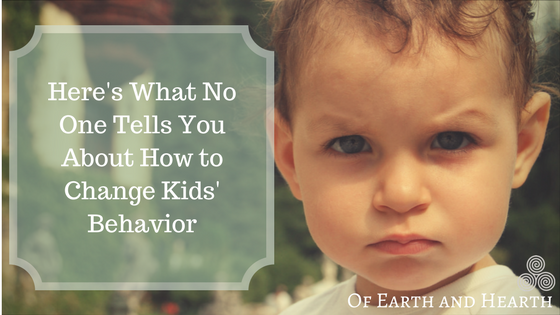Here's What No One Tells You About Changing Kids' Behavior

“Do as I say, not as I do” may be an ideal way to parent, but frankly it’s not possible. Anyone who has spent any amount of time around children knows that they are imitators. Sometimes to our surprise and amusement, sometimes to our chagrin and embarrassment. As a Family Wellness Coach, I meet with families on a daily basis who are struggling with major home disruptions and behavioral issues with their children. By the time they get to me, many of these families are at their wits’ end. Some families even face having their children placed in care settings outside their home because they can no longer cope. Most of these families accept the need to learn new tools to manage their children’s behaviors. What many don’t realize is, to change kids' behavior they must begin by learning new tools to manage their own behaviors.
In 1961 a psychologist named Alfred Bandura conducted an experiment that confirmed what parents already knew: children learn through observation and imitation. This concept is also known as modeling. Bandura’s experiment focused on learned aggression, in particular, using an inflatable clown doll known as Bobo. In the experiment, some children watched an adult act kindly toward Bobo. Others watched an adult hitting, kicking, and otherwise abusing the doll. The third group of kids had no adult model. I’m sure it will come as no surprise that the group of kids who saw the adult act aggressively toward Bobo were much more aggressive toward the doll themselves than the other children. In fact, these children were even aggressive in ways that the adults had not been, such as throwing darts or aiming a gun at Bobo, which they had not seen the adults do.
Certainly, the children in the Bobo experiment could develop their empathy or learn to walk away in order to reduce their aggression. But the easiest way to change kids' behavior in this situation was simply to expose the children to non-aggressive behaviors. The same goes for our kids at home. One of the easiest ways to change kids' behavior is to start by examining ourselves and determine if we’re modeling those same behaviors.
Whenever your child is struggling with a behavior that you do not like, ask yourself the following questions to discover if the key is changing your own behavior:
1. How am I feeling?
Am I tired, stressed, frustrated, or otherwise upset? Appropriately managing our kids is very difficult if we are unbalanced ourselves. If you are feeling poorly, your children very well may be picking up on this and feeling similar. Taking time to care for ourselves is critical to being able to care for our children. What was the last thing you did for yourself? If you can’t remember, or it’s been a while, make a point to take even 5 minutes to breathe, relax, and center yourself before returning to your children.
2. How am I reacting?
Am I expressing my upset/stress/tiredness/frustration? Have I been overly critical of what’s going on around me? Am I meeting those around me with sarcasm? Have I been speaking to those around me at all? Remember, the way you are acting in your times of stress are the way that your children will learn to act in theirs. If you cannot do anything to reduce your stress or upset right away, you can always choose to change the way you are expressing yourself.
3. What would make my child feel that this behavior is ok?
Have I been permissive with this sort of behavior in the past? Have I subtly been approving this behavior through the jokes I tell, media I consume, or comments I make? Do I act this way toward anyone else? Consistency is key when raising children. (For more information check out my post Three Fundamental Parenting Skills.) Make sure you are always addressing behavior you don’t want to continue, even in yourself and others. It is much more difficult to change kids' behavior than to prevent the development of a behavior in the first place.
4. Where else could my child have learned this?
Did my child see this on TV? Do my child’s friends act this way? Is my child exposed to other people who may be teaching them this behavior (on purpose or by engaging in the behavior themselves)? We are not the only ones our children are exposed to. If we allow our children to watch violent shows, or hang out with friends who are disrespectful we cannot be surprised if our children pick up the same behavior. Sometimes discussing these issues with older children can be beneficial, and certainly the more mature our kids are, the more they will understand and make their own behavioral choices. But it is easier to not expose our kids to negative influences than to try and change kids' behavior afterward.
5. Does my child know how to act appropriately in this situation?
Do I need to model for my child what appropriate behavior is? Sometimes kids behave badly because they don’t know how to behave otherwise in certain situations or in reaction to certain occurrences. Take a moment to consider if your child has ever encountered and successfully navigated this situation. If not, you may need to show them how to act by responding appropriately yourself.
Being in control of our own behavior is a key component of successful parenting. Our children learn not only from what we tell them but even more so from what they see us do. Sometimes to change kids' behavior we must start with evaluating and improving our own behavior.
Comments or questions? Leave them below. I’d love to chat about it! Visit Of Earth and Hearth to be the first to get access to new posts and exclusive content.
